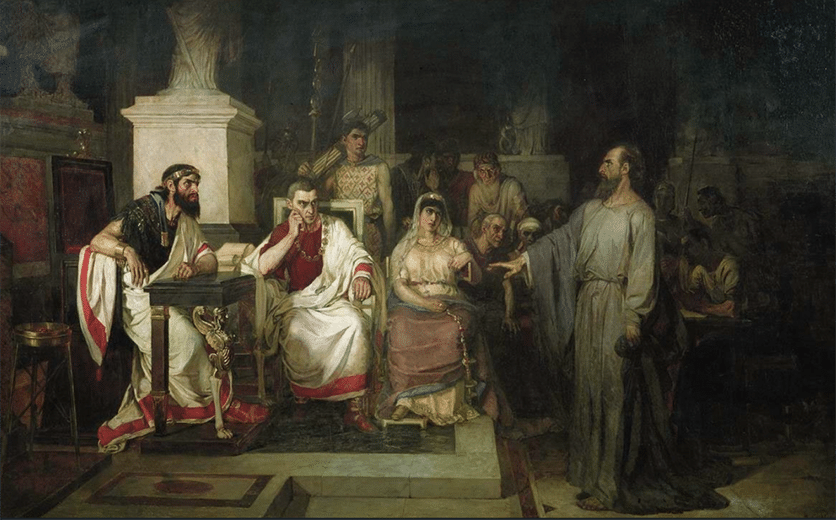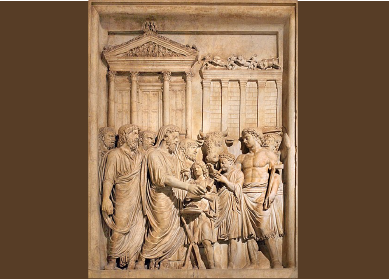Julia Berenice (born around 28 CE) was the great granddaughter of Herod the Great and a descendant of Hasmonean lineage. She held the title of queen and coruled with her brother, King Agrippa II. Berenice may be most known for her appearance alongside her brother at the trial of the apostle Paul in the book of Acts (25:13, 23; 26:30). In addition to the book of Acts, she also appears in the accounts of Roman and Jewish historians and was present at the outbreak of the Jewish-Roman War in 66 CE.
Julia Berenice lived and ruled in the tumultuous first century CE. Married and widowed twice by the age of twenty, her second marriage to her uncle King Herod of Chalcis gained her the title of Queen of Chalcis. After Herod’s death, Berenice’s brother, Agrippa II, ascended to the throne, and the brother and sister are frequently mentioned together in sources. They appear to have ruled as equals. Berenice is given honorific titles in multiple extant inscriptions, including “queen” (regina) and “ruler” (basilissa). She engaged in diplomacy with Rome (Tacitus, Hist. 2.81), and Josephus implied that she assisted on the Roman side of the Jewish-Roman War (Josephus, B.J. 2.310–427; Vita 48).
What was Berenice most well-known for?
Like most women in power at this time, Berenice was often documented in relation to the men in her life. The Jewish historian Josephus reports of a rumor that she had an incestuous relationship with her brother, which the historian suggests led to her third marriage (see also Juvenal, Sat. 6.156–160). This marriage failed due to supposed sexual promiscuity on her part (Josephus, A.J. 20.145–146). The truth of these rumors is unknown; similar spurious accusations were made against many Roman figures of power, including several emperors.
Berenice also had a relationship with Titus, a Roman general in the first Jewish revolt and the future Roman emperor. After the revolt, Berenice joined Titus in Rome, where Roman writers reported that the two were to be married. Titus ultimately dismissed her, purportedly because she was not favored by the Roman people (Cassius Dio, Hist. Rom. 65.15.3–5; Suetonius, Titus 7.1–2).
What was Berenice’s role in the Jewish Revolt against Rome?
Berenice was queen at the outbreak of the Jewish revolt against Rome in 66 CE. Rioting among the Jewish inhabitants of Jerusalem erupted due to the oppressive actions of the Roman government while she was visiting Jerusalem. Berenice made a direct plea to the procurator Florus for a peaceful resolution of the situation but was met with hostility, and her own life was threatened (Josephus, B.J. 2.310–314). She later petitioned Roman authorities to investigate the situation (B.J. 2.333) and made public appearances to advocate for peace (B.J. 2.344), though these efforts ultimately failed to prevent the ensuing war. Despite her leadership at the time of the Jewish revolt and her role in Roman politics, Berenice seems to have disappeared from the historical record after her dismissal from Rome.






